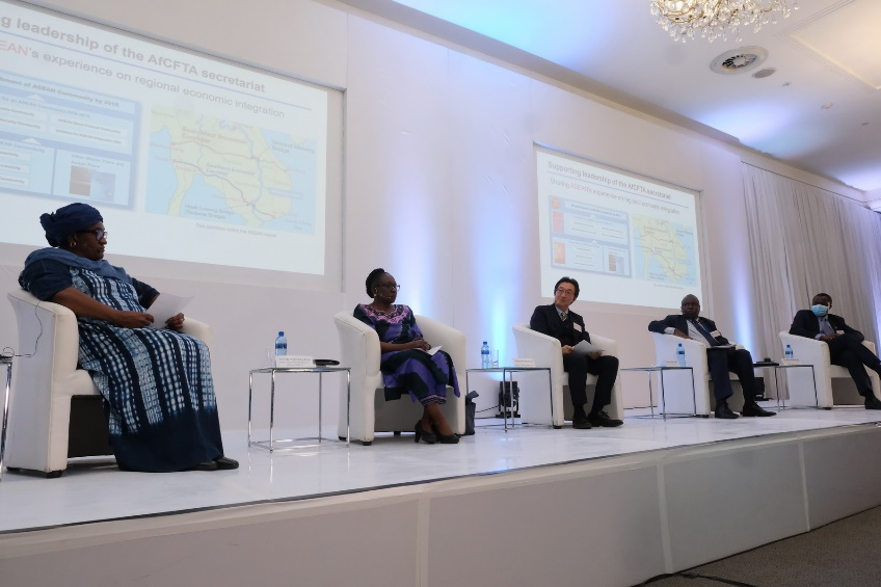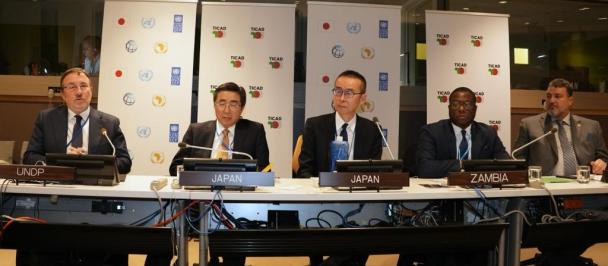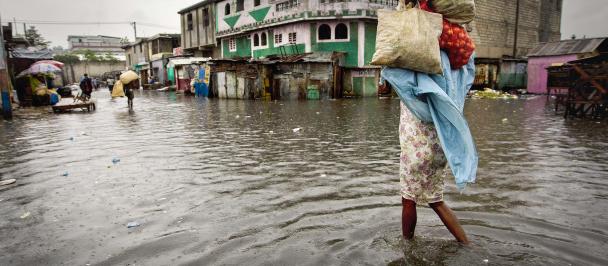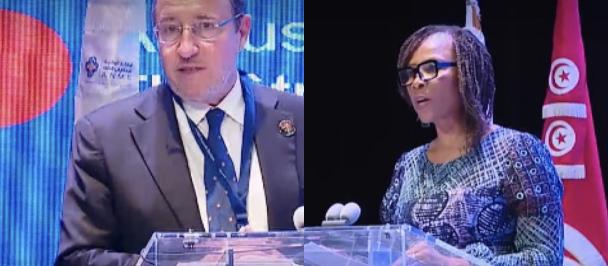Towards TICAD 8 – Advancing Africa's Economic Integration in the Post-Crisis Era
July 21, 2022

From left, Jennifer Chiriga, Chief of staff to CEO at AUDA-NEPAD as a moderator, Towela Nyirenda Jere, Head of Economic Integration at AUDA-NEPAD, Toshiyuki Nakamura, Senior Vice President of JICA, George Kararach, Lead Economist of the AfDB, Ayodele Odusola, Resident Representative of the UNDP in South Africa.
Global uncertainties such as the COVID-19 pandemic, as well as food shortages and soaring inflation amid the Russia-Ukraine crisis are among the challenges that threaten to derail Africa's growth and economic integration.
Ahead of the 8th Tokyo International Conference on African Development (TICAD8), which will be held in Tunisia on August 27 and 28 2022, key stakeholders met in South Africa on June 21 to discuss how to advance Africa’s economic integration to achieve resilient and inclusive socio-economic development.
The focus of the discussions was how to promote the implementation of the African Continental Free Trade Area (AfCFTA) agreement. The symposium, which was held in a hybrid format, was co-organized by Japan International Cooperation Agency (JICA), United Nations Development Programme (UNDP), African Union Development Agency (AUDA-NEPAD), and the African Development Bank (AfDB).
His Excellency Mr. Norio Maruyama, Ambassador of Japan to South Africa, opened the conference by stressing that TICAD focuses on the sustainable and comprehensive development of Africa, with ownership and partnership being key elements to build human security.
Mr. Maruyama pointed out that Japan has been an active partner in Africa for several decades, both in official development assistance and private sector investment. Mr. Maruyama ended his opening remarks by introducing the three key pillars of the upcoming TICAD 8 conference — economy, social challenges, and peace and stability — while also noting the potential for Japan to work with Africa in areas such as energy transition to achieve carbon neutrality.
Dr. Towela Nyirenda Jere, Head of Economic Integration at AUDA-NEPAD, noted that the AfCFTA, which aims to create a single continental market covering 1.3 billion people, has the potential of becoming the world's largest economic market with a combined gross domestic product (GDP) of US $ 3.4 trillion. When fully implemented, Ms. Nyirenda Jere said it could lift as many as 38 million people out of poverty however to achieve that requires the opening up of market opportunities through the construction of "sustainable quality and resilient infrastructure" that can support traffic and trade.
Building Resilience and the important role of SMEs
Africa is vulnerable to global shocks because of its structural weaknesses in economic management, both at the country and continental level, said Dr. Ayodele Odusola, Resident Representative of UNDP South Africa and Head of the Africa Finance Sector Hub. This presents threats to the ongoing "triple development challenges" of poverty, income inequality and joblessness.
To become more resilient, Dr. Odusola said that Africa must "break away from a dependency syndrome", noting how the continent has been importing food items that can instead be produced within Africa and then exported to the rest of the world.
Dr. Odusola added that Africa should work towards breaking out of a cycle of "being a specialist of primary exporters of primary commodities" such as in agriculture, metals, or oil and gas, when adding value will create wealth and jobs. He pointed out that African agribusiness can generate up to US$3.7 trillion, which is nearly triple the current GDP of the continent.
Dr. Odusola stressed that it was important to address risks in the investment climate in Africa to make the continent a more attractive investment destination. Among other things, there is a need to stop illicit financial flows of an estimated US$86 billion annually.
Anchoring this point, Ms. Nyirenda Jere highlighted the significant role of small-and-medium enterprises (SMEs). She noted how Africa must consider policies that will allow SMEs to thrive, including enabling them to produce goods and services that are needed. She added that creating a resilient start-up ecosystem, including resolving issues in areas such as digitalization and access to markets and financing can help create sustainable trade. "It is imperative and incumbent upon us to make sure that we do not lose the momentum" to reap the full benefits of the AfCFTA,” she explained.
Dr. Odusola echoed the remarks noting that SMEs are "the engine room of growth and development" for Africa sharing that the UNDP has facilitated a supply development programme throughout the continent to connect SMEs with big companies. But there are headwinds in how 70 percent of SMEs close down before they reach their third anniversary, he said, adding that UNDP has in response developed a "Youth Entrepreneurship Action Hub" to build the capacity of small-scale entrepreneurs, while connecting them to financial institutions and providing market access.
Mr. George Kararach, Lead Economist of the Africa Development Bank, added that it was also important to think about infrastructure in a post-pandemic world, in which he saw e-commerce as a growth market. But to secure e-commerce, building up resilient ICT infrastructure and data access on top of secure energy sources will be critical.
Building Integration, and Capacity
The panelists also discussed how to build integration across different institutions, as well as to build human capital. Dr. Odusola said it was important to create a "synergy where one-plus-one is greater than two", and to "ensure that whatever we do, we put people at the centre, the beginning and the end of the entire process".
Mr. Toshiyuki Nakamura, Senior Vice President of Japan International Cooperation Agency, said that the emphasis on human security, meaning that "no one is left behind", is at the core of the agency's efforts. Mr. Nakamura added that building resilience requires the long-term commitment of stakeholders, noting how JICA's efforts in providing financial and technical cooperation to medical institutions in Kenya and Ghana - including through training in Japan - have led to a continental network under the Africa Centers for Disease Control and Prevention that could manage COVID-19. AUDA-NEPAD, with JICA, worked to support Home Grown Solutions so that African companies produce masks and other essential supplies.
Another initiative that has proven to be effective amid food shortages caused by the Russia-Ukraine conflict was the Coalition for African Rice Development (CARD), which focuses on doubling the rice production in Africa, Mr. Nakamura added.
AfDB’s Mr. Kararach stressed the need to build robust institutions, while also noting that investors will be more attracted by the "correct incentives" as opposed to "very rigid regimes". But he also noted that crises can be turned into opportunities, citing how the African Development Bank put together a US$10 billion COVID-19 response facility that has the potential to produce vaccines which can be exported worldwide.
He noted that it was critical to uplift the African community by creating more jobs, citing data that shows that nearly two in three youth in South Africa are unemployed. To this end, he said that "integration is not just about goods and services, because you can have cultural integration and a lot of our people live across borders and they speak the same language". Mr. Kararach expressed his hopes that Africa "should have a voice at the table clearly" in the post-crisis era.
Panelists agreed that TICAD 8 will be a critical opportunity to discuss how to further advance Africa’s regional economic integration.

 Locations
Locations



